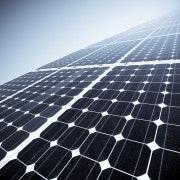Yingli plays the long game in a panel price war
Reuters
Yingli Green Energy said it expects to return to profitability only in the third quarter, a year later than its rivals, as it sells panels at lower prices to gain market share.
Yingli's shares fell as much as 13.3 per cent on Tuesday after the world's largest panel supplier by volumes posted its 10th straight quarterly loss.
A recovery in solar panel prices after a four year slump has helped Yingli's rivals such as Trina Solar, JA Solar post profits in recent quarters, while JinkoSolar posted a profit last August.
"Yingli are a little bit more aggressive with their pricing versus their competition so they give up a little bit of gross margin on that front," said Ardour Capital Investmentsanalyst Adam Krop.
Yingli's average selling price was about US63-64 cents per watt in the fourth quarter ended December 31, lower than Trina's average price of US66 cents per watt in the same period.
However, Yingli said on Tuesday it expected its solar panel shipments to rise by as much as a third this year, as it shifts focus to sell more to solar markets, besides China. That would help speed up its return to profitability.
"We expect our company to break even at the end of the second quarter and start making profits in early third quarter," a Yingli executive said on a conference call with analysts.
That is faster than what Wall Street expected. Analysts on average were expecting the company to post a profit in the fourth quarter, according to Thomson Reuters.
Higher shipments, margins
Analysts have said Yingli's heavy costs to service its debt, investments in research and development and higher fixed costs than its rivals were also contributing to the company's losses.
"I think the cost of Yingli's debt is the main reason for continued net losses," said IHS analyst Stefan de Haan, estimating the company's debt was higher than its direct rivals.
Yingli's fixed costs are higher because it's a fully integrated company, meaning that it makes its own ingots, wafers, cells and panels unlike competitors who rely on third-party suppliers for some components, RBC Capital Markets analyst Shawn Yuan said.
Still, Yingli said it expects to ship 4-4.2 gigawatts of solar panels this year, up from the 3.2 GW shipped last year, with a higher contribution from regions other than Europe, the United States and China – where prices are among the lowest.
Worldwide solar installations are set to rise by double digits to 40-45 GW in 2014, according to HIS estimates.
Much of that is expected to be driven by power subsidies in Japan and China's ambitious target to install 14.5 GW of solar generating capacity this year – close to Finland's entire power capacity.
The company's said it expects gross margins to rise to 14-16 per cent in the first quarter, when it expects to sell fewer panels in China, from 12.2 per cent in the fourth quarter.
The company's net loss shrank to $US128.2 million, or 82 cents per American depositary share, in the fourth quarter ended December 31, from $US200.5 million, or $US1.28 per ADS, a year earlier.
Revenue rose about 31 per cent to $US613 million.
Solar plant
Yingli, like its rivals, is also pushing into the higher-margin business of building solar power plants to lower its reliance on the highly-competitive business of selling panels.
Yingli said it had 1 GW of power plants projects in different approval stages across China, of which the construction of about 400-600 megawatts is expected to be complete by the end of this year.
The company has tied up with China National Nuclear Corp and others to build solar plants and said it was evaluating various approaches to hold or sell these projects.
Yingli, which is also building 200 MW of utility-scale projects outside China, said it was pushing into emerging markets in the sun-belt regions of Africa, the Middle East, Central and South America.
Solar companies such as SunEdison and SunPower are looking at retaining some solar plants, rather than selling them, to spin them off into a separate, dividend-paying entity.
Yingli shares were down 11 per cent at $US5.25 in afternoon trading on the New York Stock Exchange. The stock has more than doubled in the past year amid a broad rally in solarstocks.
Originally published by Reuters. Reproduced with permission.
















